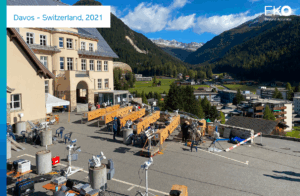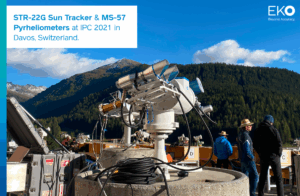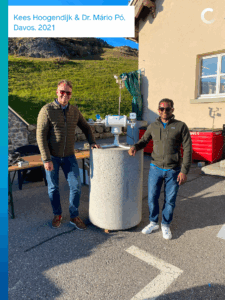Preparing for the World Radiation Reference Intercomparison
Every five years, in Davos, Switzerland, a large group solar researchers from national laboratories gather to perform precision testing and calibration of their reference solar irradiance instruments—absolute cavity radiometers and sun trackers—during the World Radiation Reference (WRR) Intercomparison Campaign. Among the tracking devices applied, the EKO Sun Tracker is valued for its simplicity and reliability, delivering accurate results even after years without use.
Hosted by the Physikalisch-Meteorologisches Observatorium Davos / World Radiation Center (PMOD/WRC), this event offers a rare opportunity to compare all reference pyrheliometers installed on automated sun trackers against the WRR—the globally recognized reference for direct solar irradiance. Experts from national labs, research institutes, and PV test centers bring their best equipment—pyrheliometers, sun trackers, data acquisition systems—and put them to the test. Precision is everything. Conditions are demanding. And the results shape climate models and energy research around the world.
The goal? To verify measurement accuracy against the WRR, improve traceability, and ensure global consistency in solar radiation data.

Equipment Check Before Traveling to Davos
1. Inspect Your Tracker & Sensors
Ensure your sun tracker, pyrheliometers, and accessories are operational. Verify alignment, cabling, and power supply.
2. Review Configuration
Check and verify your setup and measurement settings matches the latest specifications for IPC use. Confirm your logger or DAQ is correctly configured.
3. Test System Functionality
Run a full system test before departure. If any issues arise, contact EKO—we’re happy to support troubleshooting and fix problems before you leave or at the location.
🔧 Need help? Let us know in advance—we’ll be at the IPC and ready to assist on-site if needed.
EKO Sun Trackers Options for WRR Calibration

During the IPC event in Davos, participants take their equipment in and out every day, often starting well before sunrise to prepare for the first sun rays cresting behind the mountains. While it’s not officially a race, there’s an unspoken pressure to be ready for the first measurement run—every minute counts. In these demanding high-elevation conditions, what makes a real difference is having equipment that works reliably and sets up quickly. The EKO Sun Tracker series is designed precisely for this purpose: combining tracking precision, structural reliability, and user-friendly setup. Even if you only use your tracker once every five years, it’s crucial that it operates smoothly and confidently when it matters most.
With EKO’s tracker, you can focus on the measurement—not the setup.
STR-21G
- Low power consumption, Compact, GPS-synchronized sun tracker
- Optimized for pyrheliometers like one absolute cavity or routine pyrheiometer.
- Ideal for single-instrument setups
STR-22G
- Same core as the STR-21G with expanded mounting options
- Supports additional sensors (e.g., multiple absolute cavity pyrheliometers on both sides)
- Versatile platform for solar monitoring
STR-32G
- Heavy-duty tracker with 60 Nm torque capacity
- Engineered for use with spectroradiometers or multiple cavity radiometers
- Best-in-class performance for advanced research deployments
All EKO Sun Tracker models come equipped with a built-in sun sensor that automatically locates and locks onto the sun’s position. This means setup takes less than two minutes—no need for manual alignment or guesswork. Once activated, you can be confident that your sensitive radiometers will track the sun accurately from the very first light. It’s reliable enough to let you step away, grab a morning coffee, and return knowing your system is already doing the job.

Meet EKO at Davos
We are proud to announce that Akihito Akiyama, Kees Hoogendijk, and Mário Pó from EKO Instruments will be present throughout the entire Davos 2025 campaign. With decades of combined expertise in solar radiation measurement, WRR intercomparison procedures, and field calibration practices, they will be available on-site to support all participating teams and ensure optimal performance of EKO systems.
Whether you have technical questions about your equipment, need clarification on calibration procedures, or want guidance on getting the most out of your EKO Sun Tracker setup—Akihito, Kees, and Mário will be ready to help.
We’re looking forward to seeing you there and reconnecting since we last met in 2021.
